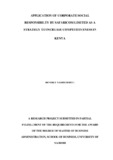| dc.contributor.author | Simiyu, Namisi B | |
| dc.date.accessioned | 2017-01-04T09:11:40Z | |
| dc.date.available | 2017-01-04T09:11:40Z | |
| dc.date.issued | 2016 | |
| dc.identifier.uri | http://hdl.handle.net/11295/98812 | |
| dc.description.abstract | Environmental complexity and dynamism has forced firms to shift focus from the consumer only and pay a little attention to the society and other key stakeholders of the organization. CSR is one of the ways that firms use as a way of giving back to the society. This objective of this study was to determine how Safaricom Limited used CSR as a strategy for competitiveness. A case study research design has been used in the study. . It was anchored on a real-life situation and results were based in a rich and holistic account of a phenomenon. The study used qualitative forms of data collection. An interview guide was used for data collection processes and procedures. Primary data was gathered by interviewing all the five departmental heads at Safaricom Limited, who were: the head of strategy and innovation, head of finance, head of customer management, head of operations management and the head of marketing. Content analysis has been used to analyze the data.. The study concludes that Safaricom Limited adopts CSR activities which are aimed at improving the livelihoods and environmental conservation. These activities include providing donations, charitable activities and environmental conservation. The company is concerned about the welfare of its employees and the working the environment for the employees. The findings further conclude that CSR is part of the company’s policies which is aimed at enhancing value and educating their customers about their products or services. The study recommends that Safaricom Limited should increase its budgetary allocation on CSR to increase its activities and programmes. This will enable the company to identify priority areas where more funds can be channeled to improve the livelihoods of the less fortunate in the society. Time and cost constraints were the major reasons limited the case study to Safaricom Limited. Therefore, the findings obtained in this study are unique to Safaricom Limited and cannot be applied either directly or indirectly to another Mobile Telecommunication firm for making generalization. A similar study should be conducted in all the three Mobile Telecommunication firms in Kenya to find out how these firms utilize CSR as a strategy to enhance competitiveness. This will enable the researcher to compare findings and establish some of the common CSR strategies used by these firms and hence a more reliable conclusion can be drawn. | en_US |
| dc.language.iso | en | en_US |
| dc.publisher | University of Nairobi | en_US |
| dc.rights | Attribution-NonCommercial-NoDerivs 3.0 United States | * |
| dc.rights.uri | http://creativecommons.org/licenses/by-nc-nd/3.0/us/ | * |
| dc.subject | Application Of Corporate Social Responsibilty By Safaricom Limited As A Strategy To Increase Competitiveness In Kenya | en_US |
| dc.title | Application Of Corporate Social Responsibilty By Safaricom Limited As A Strategy To Increase Competitiveness In Kenya | en_US |
| dc.type | Thesis | en_US |



